Posts
- Royal Society report: Unlocking thermal energy
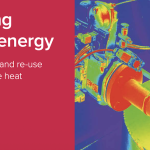 Developing systems to capture, store and reuse the vast amounts of waste heat generated through industry could be a huge opportunity for the UK to strengthen
Developing systems to capture, store and reuse the vast amounts of waste heat generated through industry could be a huge opportunity for the UK to strengthen - Entrainment across turbulent interfaces
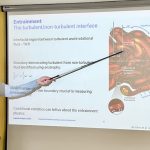 Turbulent flows are known to broaden with downstream distance, owing to the entrainment and mixing of ambient fluid into the flow. In the special case where
Turbulent flows are known to broaden with downstream distance, owing to the entrainment and mixing of ambient fluid into the flow. In the special case where - Fluid Mechanics for Green Buildings
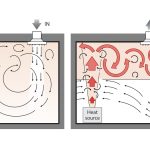 Decarbonisation of buildings is one of the main challenges for the energy transition. In particular, the provision of heating, cooling, and ventilation to maintain a comfortable
Decarbonisation of buildings is one of the main challenges for the energy transition. In particular, the provision of heating, cooling, and ventilation to maintain a comfortable - Multiphase flows in volcanic systems
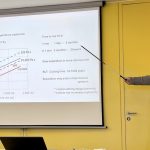 This week’s scheduled speaker, Angus Fotherby, was unwell and could not give the first seminar of the new year. We wish him a quick recovery and
This week’s scheduled speaker, Angus Fotherby, was unwell and could not give the first seminar of the new year. We wish him a quick recovery and - Two new PhD opportunities available, apply now
 Two new PhD opportunities are being advertised to work on data centres cooling and particle dispersal in the atmosphere. Please see the details below.
Two new PhD opportunities are being advertised to work on data centres cooling and particle dispersal in the atmosphere. Please see the details below. - Effects of permeability perturbations in porous media flow
 One of the challenges with modelling subsurface flows is the uncertainty in measurements of geological properties, mostly due to limited resolution in observation methods. Typically, the
One of the challenges with modelling subsurface flows is the uncertainty in measurements of geological properties, mostly due to limited resolution in observation methods. Typically, the - Plumes of settling and dissolving particles
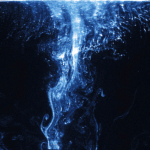 In small rocky planets, the interplay between pressure and temperature profiles may cause the iron-rich liquid core to solidify from the outer boundary inward. As pure
In small rocky planets, the interplay between pressure and temperature profiles may cause the iron-rich liquid core to solidify from the outer boundary inward. As pure - 2025 Energy Masterclass
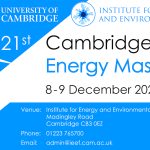 The Cambridge Energy Masterclass was a two-day intensive meeting of lectures and discussions, with talks from leading experts in various aspects of energy demand and supply.
The Cambridge Energy Masterclass was a two-day intensive meeting of lectures and discussions, with talks from leading experts in various aspects of energy demand and supply. - High-performance materials for hydrogen production
 Investigating exsolution of metal nanoparticles is an area of evolving interest. Metal nanoparticles have been found to exsolve from metal oxides in the perovskite family under reducing conditions
Investigating exsolution of metal nanoparticles is an area of evolving interest. Metal nanoparticles have been found to exsolve from metal oxides in the perovskite family under reducing conditions - Decoupling strategies in electrochemical water splitting
 The storage of renewably-generated energy as hydrogen via the electrolysis of water is a fundamental cornerstone of a sustainable hydrogen economy. Conventional electrolysers usually require stable
The storage of renewably-generated energy as hydrogen via the electrolysis of water is a fundamental cornerstone of a sustainable hydrogen economy. Conventional electrolysers usually require stable - PhD student’s video shortlisted in international competition
 PhD student Poorya Shaghaghi recently took part in the 2025 International Video Challenge developed by the journal Buildings & Cities and the Academy for Territorial Development
PhD student Poorya Shaghaghi recently took part in the 2025 International Video Challenge developed by the journal Buildings & Cities and the Academy for Territorial Development - On the thermal drift of an ATES system subject to different heating and cooling loads
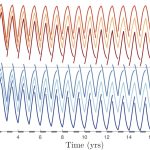 Aquifer thermal energy storage systems can provide a heat source in the winter by extracting warm water from a subsurface reservoir. The extracted fluid cools as
Aquifer thermal energy storage systems can provide a heat source in the winter by extracting warm water from a subsurface reservoir. The extracted fluid cools as - Coupling rheology and segregation in granular flows
 During the last fifteen years there has been a paradigm shift in the continuum modelling of granular materials, most notably with the development of rheological models,
During the last fifteen years there has been a paradigm shift in the continuum modelling of granular materials, most notably with the development of rheological models, - Decarbonisation of Industrial Clusters
 Professor Joe Howe is the Net Zero Professor at the University of Lincoln and the academic lead for the Humber Industrial Cluster. The Humber Cluster spans
Professor Joe Howe is the Net Zero Professor at the University of Lincoln and the academic lead for the Humber Industrial Cluster. The Humber Cluster spans - Particle-driven convection
 Particle-driven convection occurs when a layer of fluid containing dense particles is located above a layer of clear, particle-free fluid. This can drive a variation on
Particle-driven convection occurs when a layer of fluid containing dense particles is located above a layer of clear, particle-free fluid. This can drive a variation on - Challenges of the Energy Transition
 Ten years ago, the Paris COP conference heralded an exceptional meeting to tackle climate change, backed by science, and soon embraced by industry. Much has been
Ten years ago, the Paris COP conference heralded an exceptional meeting to tackle climate change, backed by science, and soon embraced by industry. Much has been - Large-scale energy storage in salt caverns
 Large-scale storage technologies are crucial to balance consumption and intermittent production of renewable energy. At times of excess production, some renewable energy might be converted into
Large-scale storage technologies are crucial to balance consumption and intermittent production of renewable energy. At times of excess production, some renewable energy might be converted into - Multiscale models for ocean-atmosphere exchanges
 Wave breaking occurs at the ocean surface at moderate to high wind speeds, with significant impacts on the transfer of momentum, energy and mass between the
Wave breaking occurs at the ocean surface at moderate to high wind speeds, with significant impacts on the transfer of momentum, energy and mass between the - On the growth of chemical gardens
 Chemical gardens are self‑assembled structures of semi‑permeable precipitates. They attract significant interest due to their relevance to sub‑oceanic hydrothermal vents and the origin of life. A
Chemical gardens are self‑assembled structures of semi‑permeable precipitates. They attract significant interest due to their relevance to sub‑oceanic hydrothermal vents and the origin of life. A - On transients in displacement ventilation
 Buildings require ventilation to supply fresh, clean air and so ensure that contaminants and heat do not accumulate. Ventilation strategies such as displacement ventilation may be
Buildings require ventilation to supply fresh, clean air and so ensure that contaminants and heat do not accumulate. Ventilation strategies such as displacement ventilation may be - Characterising a flow from its surface properties
 The accurate modelling of geophysical flows often requires information which is difficult to measure and therefore poorly quantified. For example, it is difficult to estimate the
The accurate modelling of geophysical flows often requires information which is difficult to measure and therefore poorly quantified. For example, it is difficult to estimate the - Fracture network connectivity
 Just before the beginning of term, professor Weiwei Zhu from the Institute of Geology and Geophysics of the Chinese Academy of Sciences visited us and presented
Just before the beginning of term, professor Weiwei Zhu from the Institute of Geology and Geophysics of the Chinese Academy of Sciences visited us and presented - New experimental insight to limit corrosion in CCS plants
 Carbon dioxide-induced corrosion of industrial equipment is very common, costly and particularly poses new challenges for Carbon Capture and Storage (CCS) systems. The role of impurities,
Carbon dioxide-induced corrosion of industrial equipment is very common, costly and particularly poses new challenges for Carbon Capture and Storage (CCS) systems. The role of impurities, - Convective dissolution of capillary-trapped carbon dioxide
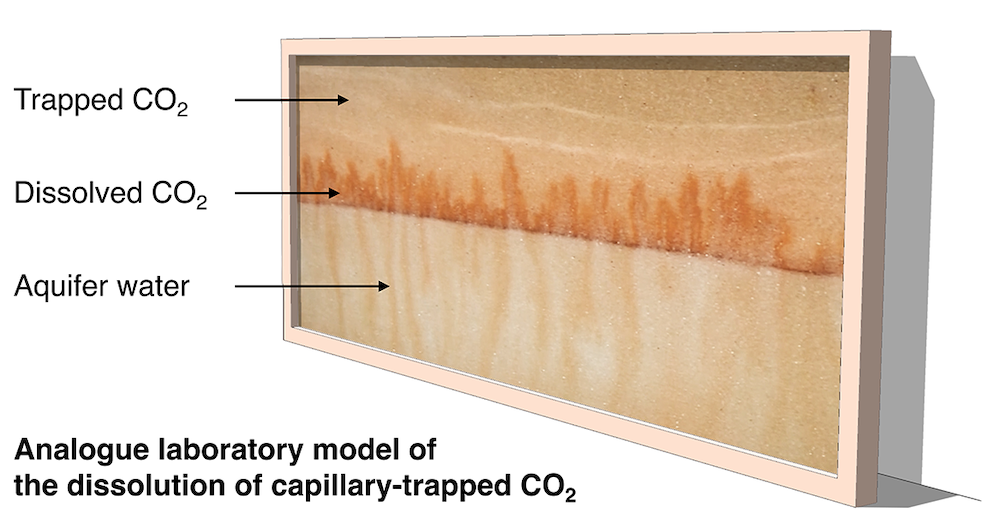 Carbon storage in deep saline aquifers has become an important part of plans to decarbonise the energy system. Typically, aquifers are composed of a porous, permeable
Carbon storage in deep saline aquifers has become an important part of plans to decarbonise the energy system. Typically, aquifers are composed of a porous, permeable - From IEEF to the mining and energy industries
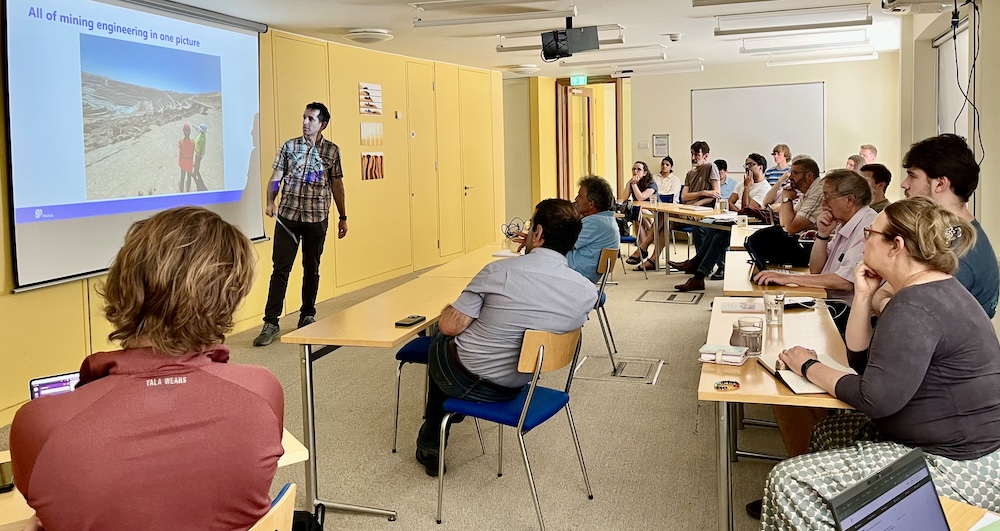 Jason Furtney was a student at the Institute in the early 2000s, after studying geology at Edinburgh University. Since then, he has been working as a
Jason Furtney was a student at the Institute in the early 2000s, after studying geology at Edinburgh University. Since then, he has been working as a - Summer garden party: congratulations Marie!
 A Summer Garden Party & Hog Roast was held at the Bullard Labs on Thursday 19 June to celebrate Marie Edmonds’ election to the Royal Society.
A Summer Garden Party & Hog Roast was held at the Bullard Labs on Thursday 19 June to celebrate Marie Edmonds’ election to the Royal Society. - Mixing and chemical transfers in particle clouds
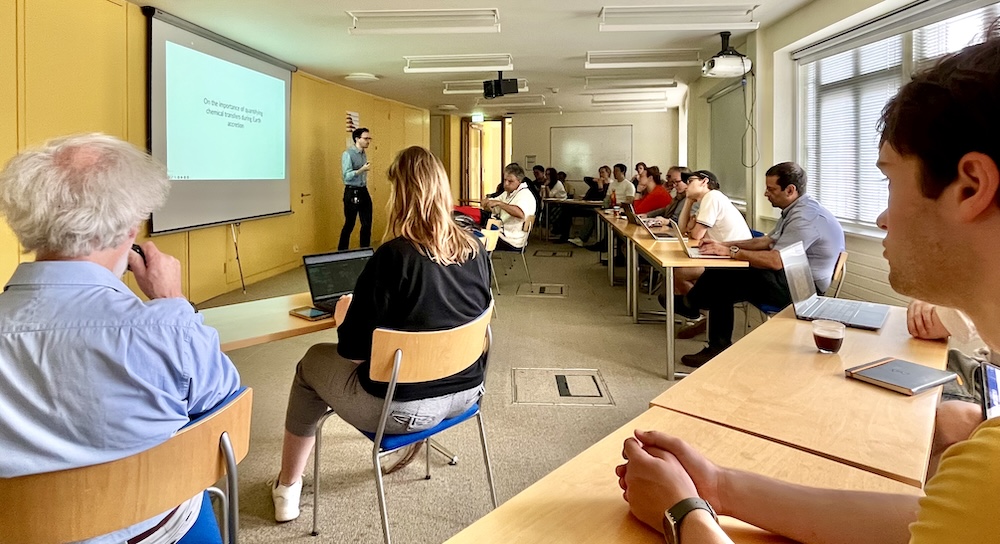 Dr Quentin Kriaa is a new Assistant Professor in Climate and Environmental Fluid Dynamics, and he joined the Institute at the beginning of Easter term. Today,
Dr Quentin Kriaa is a new Assistant Professor in Climate and Environmental Fluid Dynamics, and he joined the Institute at the beginning of Easter term. Today, - Celebrating 25 years at the University
 On Monday 9 June, an event was held at the University to celebrate members of staff who have been in Cambridge for 25 years. The event
On Monday 9 June, an event was held at the University to celebrate members of staff who have been in Cambridge for 25 years. The event - Detecting blood diseases using fluid mechanics
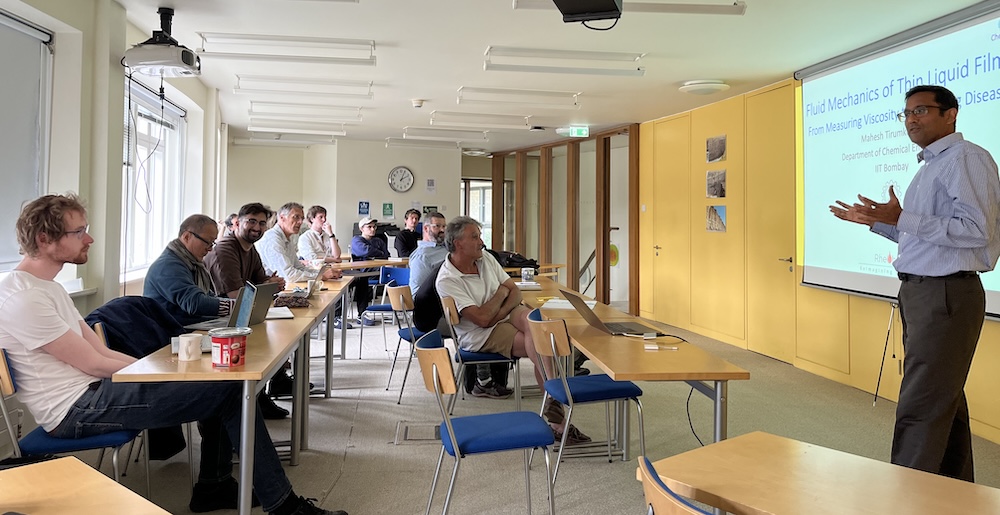 Prof Mahesh Tirumkudulu from the Indian Institute of Technology in Bombay has developed a unique method to measure the viscosity of a drop of liquid based
Prof Mahesh Tirumkudulu from the Indian Institute of Technology in Bombay has developed a unique method to measure the viscosity of a drop of liquid based - Coastal upwelling in lakes
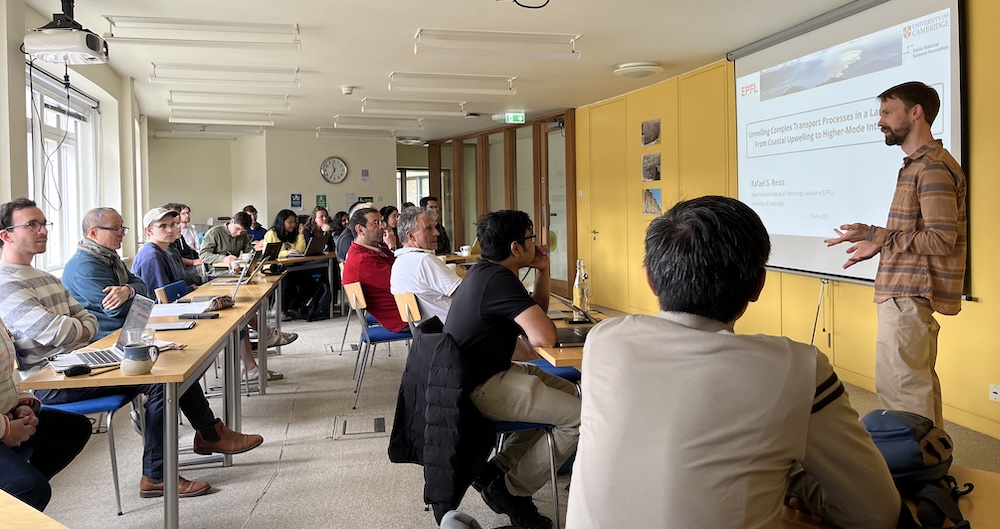 Large lakes tend to be thermally stratified, with a layer of relatively warm water near the surface, and a deeper layer of colder water underneath. The
Large lakes tend to be thermally stratified, with a layer of relatively warm water near the surface, and a deeper layer of colder water underneath. The - Plumes in a turbulent cross-flow
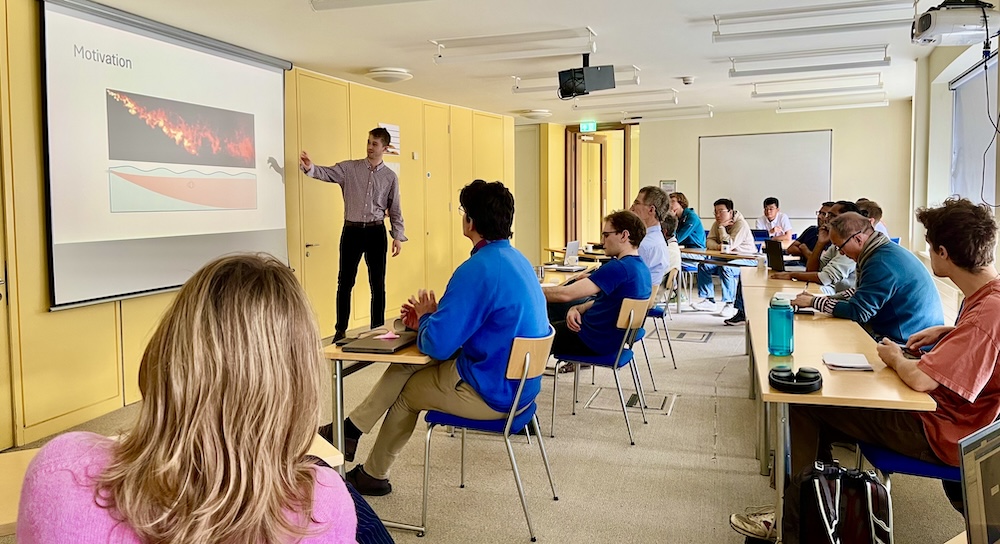 During the second part of today’s seminar, MPhil student James Sear presented the results of his new experiments on turbulent plumes in a cross-flow. During the
During the second part of today’s seminar, MPhil student James Sear presented the results of his new experiments on turbulent plumes in a cross-flow. During the - Efficiency of carbon storage in aquifers
 During the first part of today’s seminar, PhD student Ross Shepherd presented some of his recent work on the injection and storage of CO2 into underground
During the first part of today’s seminar, PhD student Ross Shepherd presented some of his recent work on the injection and storage of CO2 into underground - Poorya Shaghaghi awarded the Mellon bursary
 Clare Hall PhD student Poorya Shaghaghi has recently been awarded a Mellon bursary by his College. This award is given by Clare Hall to up to
Clare Hall PhD student Poorya Shaghaghi has recently been awarded a Mellon bursary by his College. This award is given by Clare Hall to up to - Primary school children visited the Flow Labs
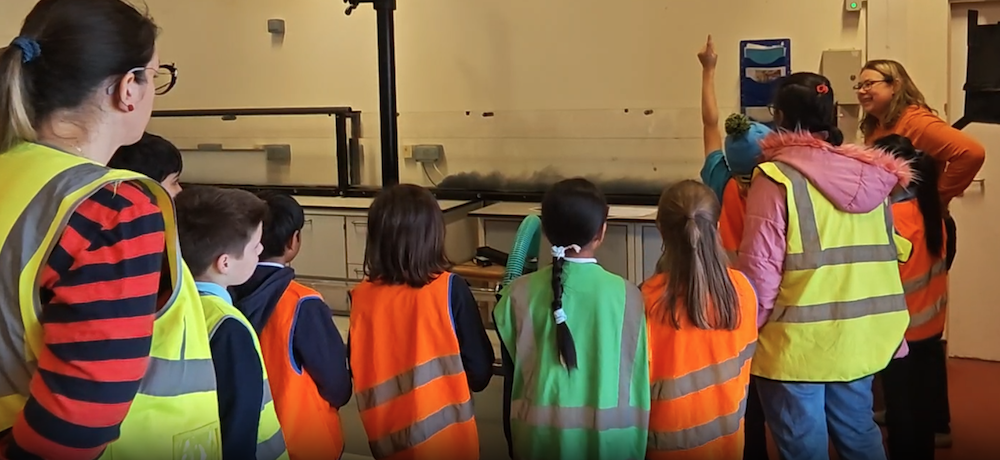 On Tuesday 20 May, 60 Year-4 children from our local primary school visited the Earth Sciences department. They explored different volcanic processes and new technologies for
On Tuesday 20 May, 60 Year-4 children from our local primary school visited the Earth Sciences department. They explored different volcanic processes and new technologies for - Early cancer detection using nanoparticles
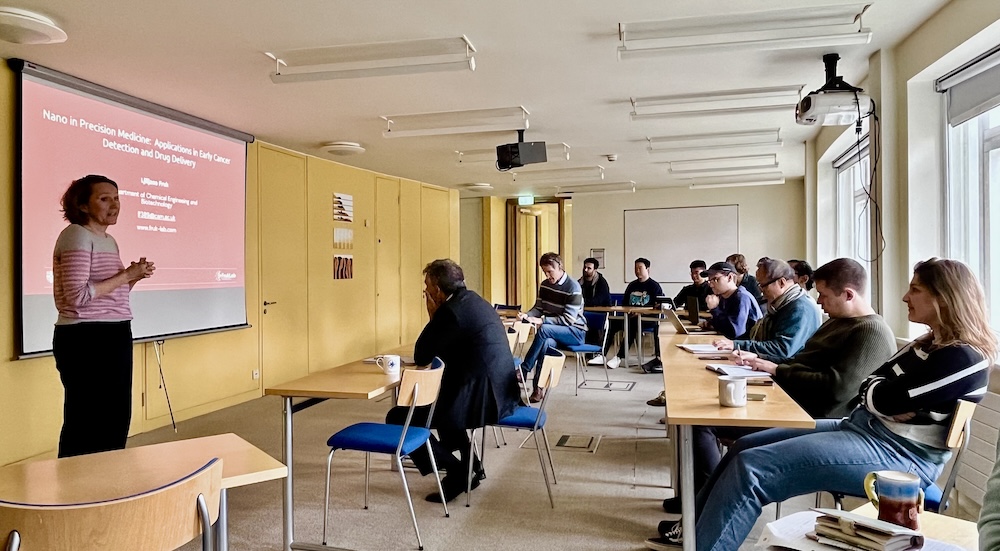 Professor Ljiljana Fruk has been studying the design principles and biomedical applications of organic and hybrid nanomaterials. These can be used for real-time detection of senescent
Professor Ljiljana Fruk has been studying the design principles and biomedical applications of organic and hybrid nanomaterials. These can be used for real-time detection of senescent - Local ionic conditions conducive to Parkinson’s disease
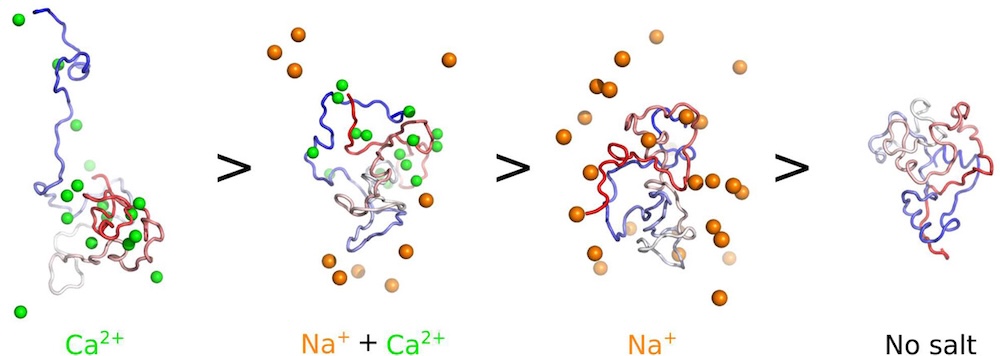 Parkinson’s disease is linked to the aggregation of the intrinsically disordered protein α-synuclein (aSyn), but the precise triggers and mechanisms driving this process remain unclear. Local
Parkinson’s disease is linked to the aggregation of the intrinsically disordered protein α-synuclein (aSyn), but the precise triggers and mechanisms driving this process remain unclear. Local - Earth Sciences Alumni visited the Institute
 On Saturday 17 May, alumni from the Department of Earth Sciences visited the Institute and the Bullard Laboratories. Professor Andy Woods presented some of the research
On Saturday 17 May, alumni from the Department of Earth Sciences visited the Institute and the Bullard Laboratories. Professor Andy Woods presented some of the research - Measuring vertical mixing in the ocean using radium isotopes
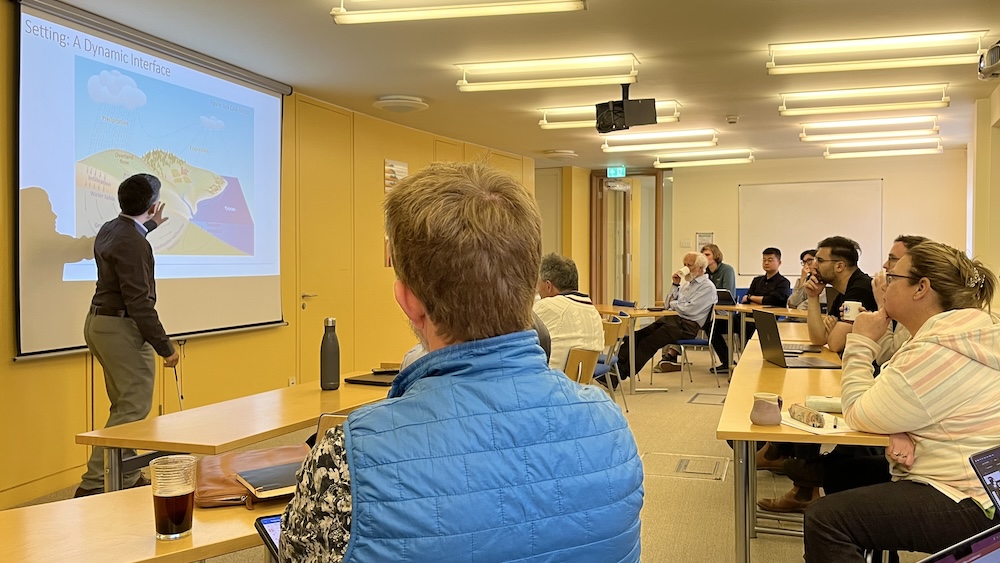 The coastal ocean is a highly dynamic and vital biogeochemical mediator between land and sea. Coastal waters frequently experience poor water quality: this is partly due
The coastal ocean is a highly dynamic and vital biogeochemical mediator between land and sea. Coastal waters frequently experience poor water quality: this is partly due - Interaction of mechanical ventilation and natural convection
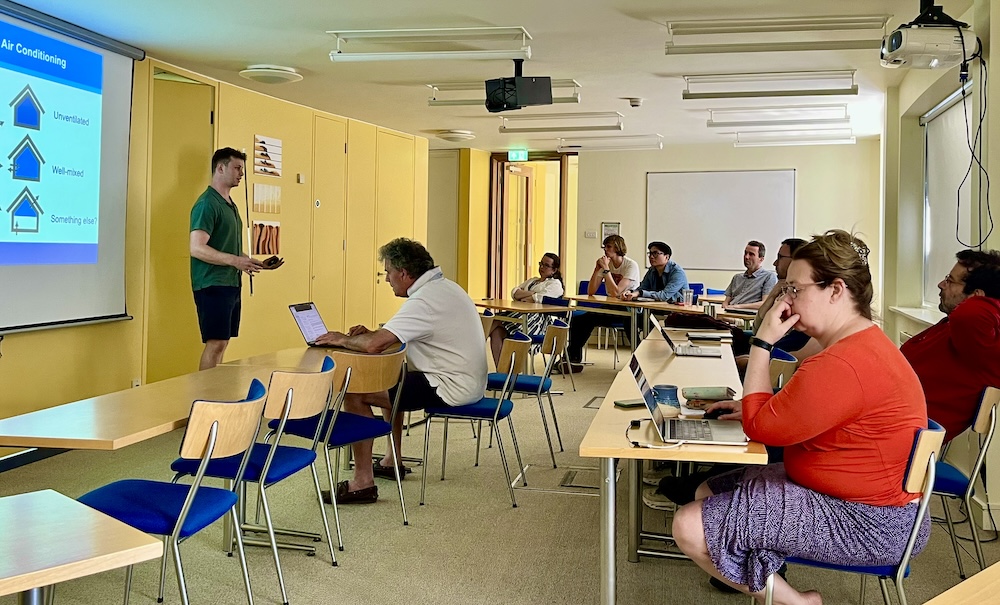 During the first seminar of Easter term, PhD student Dan Toy presented his recent work on building ventilation. Over the last few years, Dan has been
During the first seminar of Easter term, PhD student Dan Toy presented his recent work on building ventilation. Over the last few years, Dan has been - Dr Quentin Kriaa is joining the Institute
 Dr Quentin Kriaa is joining the Institute as a new Assistant Professor in Climate and Environmental Fluid Dynamics, a joint position between the Department of Earth
Dr Quentin Kriaa is joining the Institute as a new Assistant Professor in Climate and Environmental Fluid Dynamics, a joint position between the Department of Earth - Professor Routh awarded the Thomas Graham Lecture
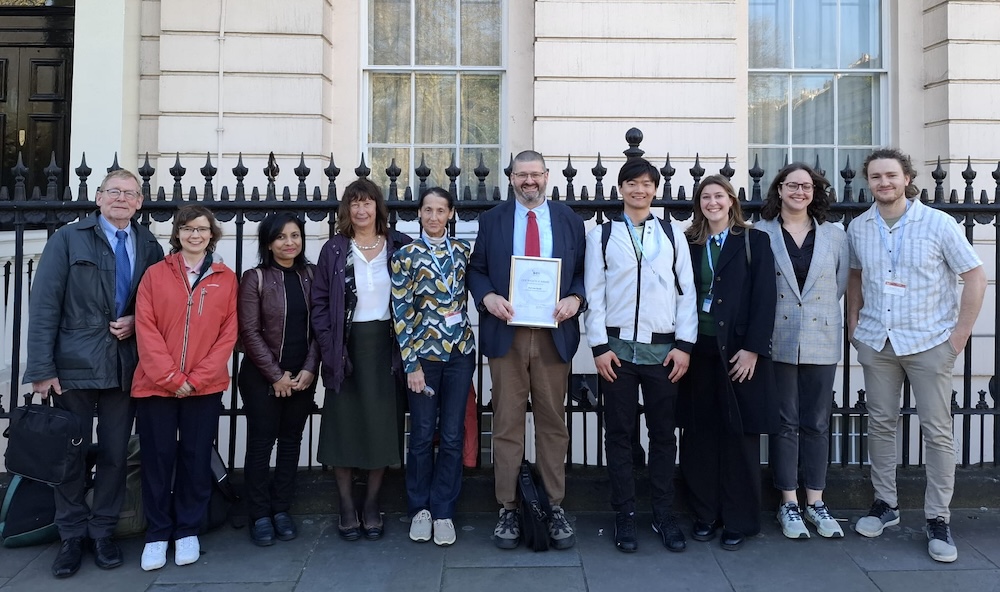 Professor Alex Routh has recently been awarded the Thomas Graham Lecture. The Graham Lecture is awarded to researchers working in the UK, who are in the
Professor Alex Routh has recently been awarded the Thomas Graham Lecture. The Graham Lecture is awarded to researchers working in the UK, who are in the - Head of Institute took part in Royal Society visit to the Japanese Academy of Sciences
 On Friday 21 March 2025, professor Andy Woods returned from a 2-day visit to the Japan Academy. The visit was organised with the Royal Society to
On Friday 21 March 2025, professor Andy Woods returned from a 2-day visit to the Japan Academy. The visit was organised with the Royal Society to - New organic-inorganic multilayer microcapsules with superior mechanical properties
 Microencapsulation is used across multiple industrial sectors to immobilise fragrances, flavours, and bioactive compounds. It offers numerous advantages, including enhanced stability and prolonged shelf life of
Microencapsulation is used across multiple industrial sectors to immobilise fragrances, flavours, and bioactive compounds. It offers numerous advantages, including enhanced stability and prolonged shelf life of - Research update published in GeoCam
 A research update on some of the work being carried out at the Institute was published today in the latest issue of GeoCam, the magazine for
A research update on some of the work being carried out at the Institute was published today in the latest issue of GeoCam, the magazine for - Seasonal regimes of warm water intrusion toward Antarctic ice shelves
 The future of floating Antarctic ice shelves is one of the principal uncertainties surrounding projections of future sea level rise. Melting of Antarctic ice shelves is
The future of floating Antarctic ice shelves is one of the principal uncertainties surrounding projections of future sea level rise. Melting of Antarctic ice shelves is - Novel Electrocatalysts for Hydrogen Production
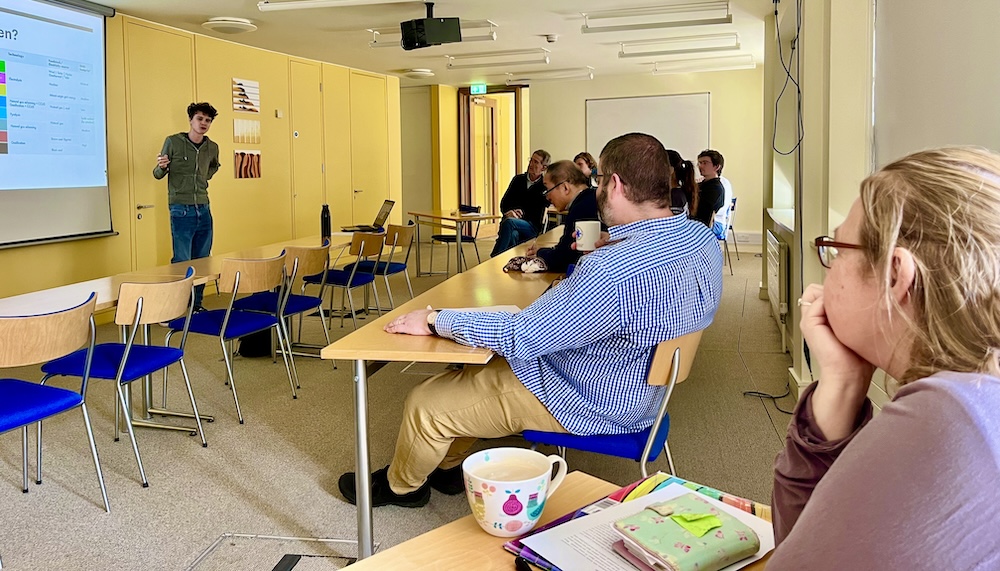 Today was the last seminar of Lent term, and Part III student James Fidler presented his recent work on new catalyst materials for hydrogen production through
Today was the last seminar of Lent term, and Part III student James Fidler presented his recent work on new catalyst materials for hydrogen production through - Focus on Fluids: Dispersive mixing
 Professor Andy Woods was recently invited to write a short “Focus on Fluids” article for the Journal of Fluid Mechanics. The article reviews some of the
Professor Andy Woods was recently invited to write a short “Focus on Fluids” article for the Journal of Fluid Mechanics. The article reviews some of the - Aquifer thermal energy storage
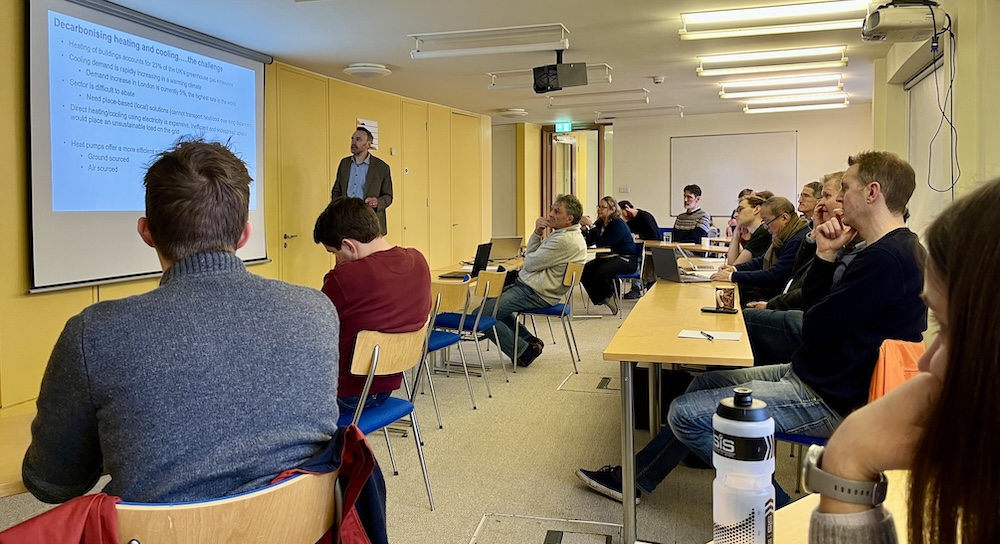 Professor Matthew Jackson from Imperial College London visited us today and presented his recent work on Aquifer Thermal Energy Storage (ATES) systems. This underground thermal energy
Professor Matthew Jackson from Imperial College London visited us today and presented his recent work on Aquifer Thermal Energy Storage (ATES) systems. This underground thermal energy - Flows through reactive porous rocks
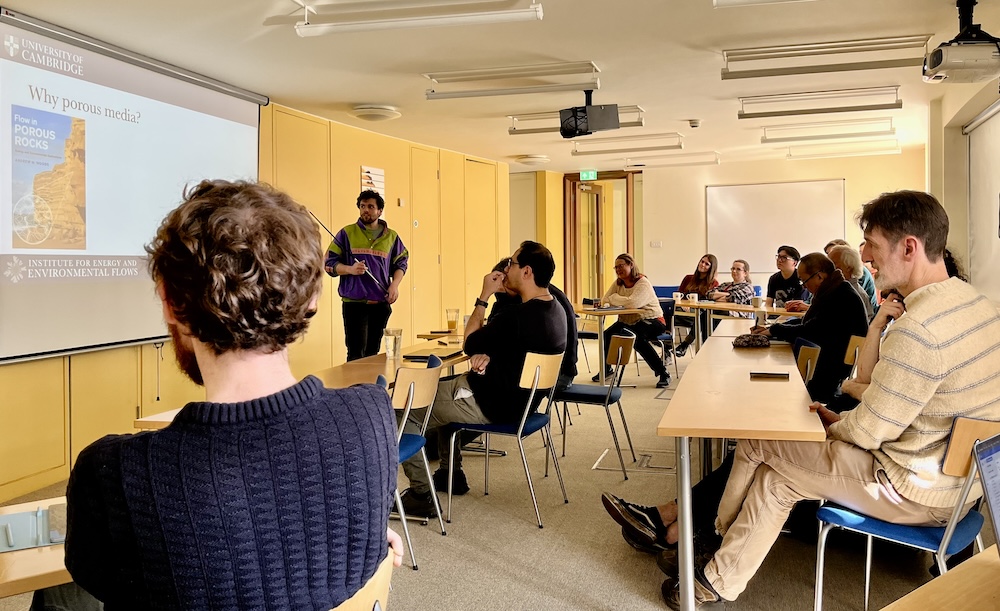 To celebrate his recent submission, PhD student Sam Clarke presented some of the results of his work at the weekly seminar today. During his time at
To celebrate his recent submission, PhD student Sam Clarke presented some of the results of his work at the weekly seminar today. During his time at - Decoupling polymers from fossil resources
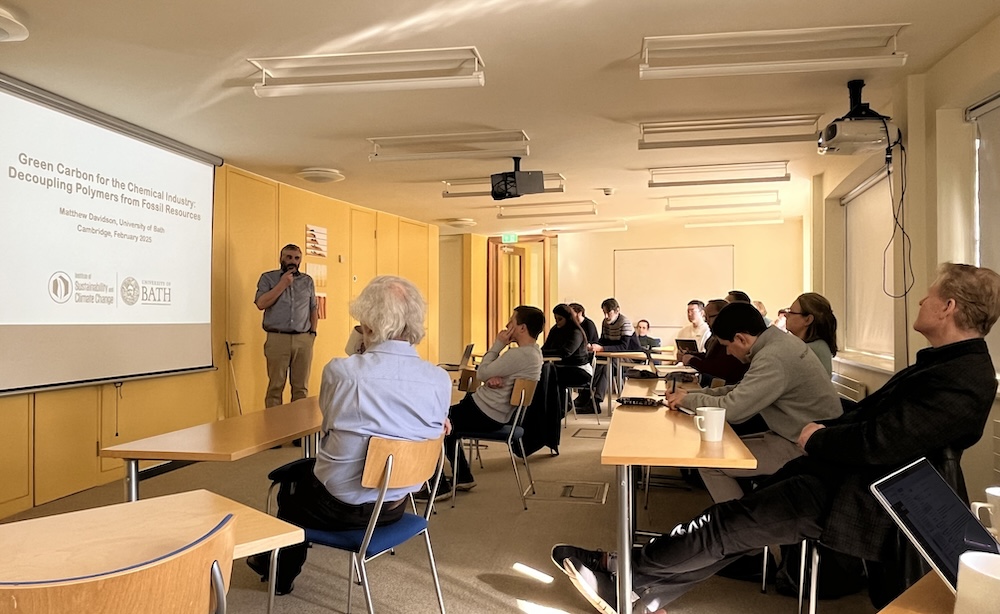 Professor Matthew Davidson is the director of the Institute of Sustainability and Climate Change of the University of Bath. He visited us today and discussed some
Professor Matthew Davidson is the director of the Institute of Sustainability and Climate Change of the University of Bath. He visited us today and discussed some